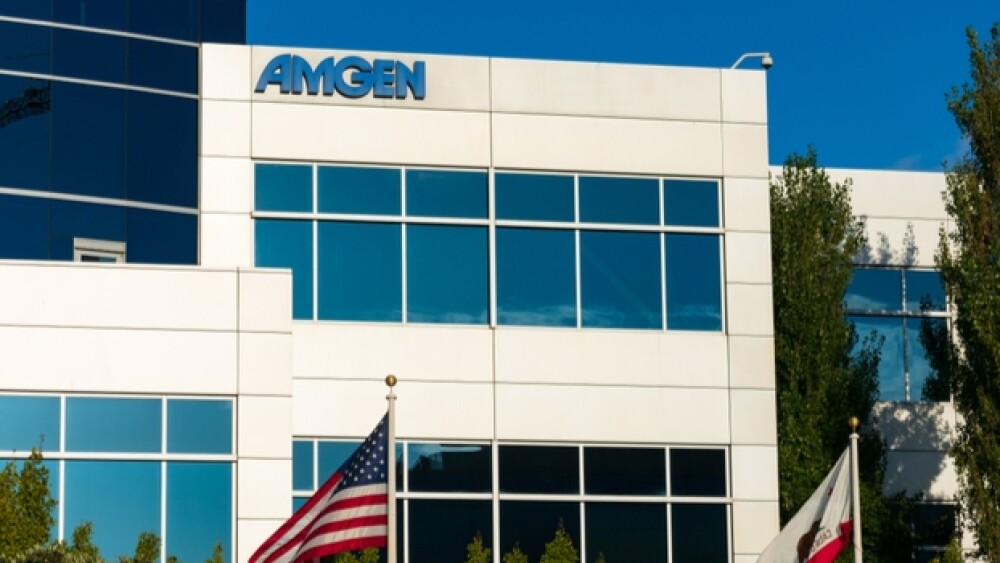On March 4, 2021, Amgen announced that they had acquired Five Prime Therapeutics for $38 per share in cash, which is an equity value of about $1.9 billion.
Michael Vi/Shutterstock
On March 4, 2021, Amgen announced that they had acquired Five Prime Therapeutics for $38 per share in cash, which is an equity value of about $1.9 billion. Five Prime’s lead asset is bemarituzumab, a first-in-class, Phase III-ready anti-FGFR2b antibody that showed a lot of promise in a Phase II trial for gastric or gastroesophageal junction (GEJ) cancer. The companies believe the drug may be useful for treating other epithelial cancers, including lung, breast, ovarian and other cancers.
That seems straightforward enough, but a look at a filing with the Securities and Exchange Commission (SEC) provided a more complicated story. In the summer of 2020, Five Prime’s stock was in the basement. They had a failed drug trial in 2017 that was partnered with Bristol Myers Squibb, and they were waiting for the readout of bemarituzumab’s Phase II trial.
Then on November 8, they reported positive topline data from the Phase II trial.
Amgen and Five Prime had discussed a collaboration in 2019, but nothing came of it, and after the Phase II data readout, Five Prime was looking for partners. Beginning on November 23, they gave presentations to 15 different possible partners in less than a month, then solicited bids to 13 of them.
Five of those companies rose to the top, but Amgen wasn’t the first. Instead, Party C offered $25 per share, about $1.2 billion. Amgen submitted its offer two days later, on January 29, 2021. Five Prime’s board reviewed the two bids, as well as two others, then reached out to everyone involved and indicated they had a buyout offer and wanted additional bids.
Amgen, Party C and a third group (Party D) rose to the top. Then Party D lost interest on February 18, which was the same day Amgen upped the ante to $32 per share. Party C decided they could sweeten the deal to the high $20s or low $30, but didn’t plan on submitting a formal offer. Five Prime told them they’d need to bid higher, and told Amgen to bring a final offer.
On March 1, Amgen offered their final bid of $38 per share, although as it turned out, they were bidding against themselves because Party C had dropped out.
The overall bargaining period was dubbed the “Bema Collab,” with a total of 15 “potential counterparties,” according to the Five Prime filing.
“On January 23, 2021, a senior representative of Party C called William Ringo, Chairman of the Five Prime Board, to reiterate Party C’s strong interest in Bema and confirmed Party C was planning on submitting a Bema Collaboration proposal the following week; on January 22, 2021, a representative of Party B emailed Dr. Mody to indicate that Party B’s intention was to submit a Bema Collaboration proposal; and on January 23, 2021, Dr. Mody spoke with a representative of Party D, who indicated that Party D was finalizing its proposal and would submit a proposal by January 29, 2021.” And Party A also wanted to participate.
Amgen reports that the Five Prime acquisition, including bemarituzumab, supports its international expansion strategy. Gastric cancer is one of the most common types of cancer around the world, especially in the Asia-Pacific region, where it expects to create significant volume growth. It plans to leverage its presence in Japan and other Asia-Pacific markets to maximize the drug’s potential. The company will also receive a percentage of royalties on future net sales in Greater China from the high teens to the low twenties from a pre-existing co-development and commercialization deal between Five Prime and Zai Lab (Shanghai) Co., Ltd.
“The acquisition of Five Prime offers a compelling opportunity for Amgen to strengthen our oncology portfolio with a promising late-stage, first-in-class global asset to treat gastric cancer,” said Robert A. Bradway, chairman and chief executive officer of Amgen. “We look forward to welcoming the Five Prime team to Amgen and working with them to leverage our best-in-class monoclonal antibody manufacturing capabilities to supply additional clinical materials, as well as expanded production quantities, to realize the full potential of bemarituzumab for even more patients around the world as quickly as possible.”
Featured Jobs on BioSpace





